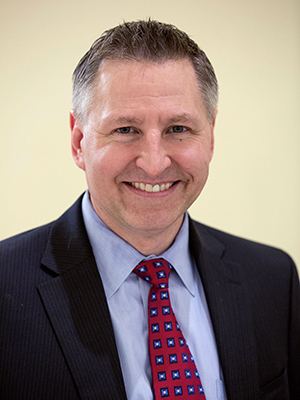
Jon Retzlaff, MBA, MPA
CURRENT EFFORTS TO REDUCE FEDERAL SPENDING have complicated Congress’ ability to financially support lifesaving cancer research. The debt ceiling compromise agreement passed in the summer of 2023 limits overall federal spending for fiscal years 2024 and 2025, which run from Oct. 1 to Sept. 30 of each year.
The agreement has limited efforts to complete the 2024 budget and threatens critical funding for the National Institutes of Health (NIH) and the National Cancer Institute (NCI). Unfortunately, this is not just a one-year problem, as similar issues and challenges are expected once Congress begins work on the 2025 budget.
This situation underscores why it is more important than ever for those in the medical research community to speak often with their representatives in Congress and congressional staff members. Legislators need to understand the damaging effects that reduced funding for the NIH and the NCI would have on our nation’s health and how sustained investments in these agencies support remarkable advances in biomedical research that lead to improved cancer prevention and major reductions in cancer mortality.
To inspire support on Capitol Hill for the lifesaving research that the NIH and the NCI make possible, the American Association for Cancer Research (AACR) is sponsoring and leading numerous initiatives:
- The AACR Early-Career Hill Day, which occurred Feb. 26 and 27, brought 20 early-career researchers to the U.S. Capitol to advocate for continuing strong investments in cancer research through the NIH and the NCI.
- The AACR will unveil the AACR Cancer Disparities Progress Report 2024 at a congressional briefing on Capitol Hill on May 15. This third edition of the report will raise awareness about the enormous toll that cancer exacts on racial and ethnic minorities and other medically underserved populations, as well as highlight areas of recent progress in reducing cancer health disparities. The report will also provide specific recommendations for achieving health equity for all people regardless of their race, ethnicity, sexual orientation, gender identity, socioeconomic status or the community in which they live.
- The AACR will again partner with the Association of American Cancer Institutes for the annual Joint Hill Day in support of federal funding for cancer research on May 16.
- The AACR will release the 14th annual Cancer Progress Report on Sept. 17. This report is a cornerstone of the AACR’s efforts to educate policymakers and the public on the extraordinary advances being made in cancer research and how they help improve care for people with cancer.
- The following day, Sept. 18, the AACR will serve as the lead sponsor of the Rally for Medical Research Hill Day for the 12th consecutive year. This initiative allows advocates from 400 participating organizations to speak with one voice about making NIH funding a national priority.
The medical research advocacy community has a lot to be proud of over the past eight years. In that time, Congress increased the NIH’s budget by 57%, but even with these funding increases, the NCI is currently only able to fund approximately 10% of the grant applications it receives. This is an extremely concerning situation, especially in light of the unprecedented number of scientific opportunities that exist today to advance progress and save lives for patients with cancer.
Bottom line, today’s environment underscores why it is so important for you to take the time to advocate for robust and sustained annual funding increases for the NIH and the NCI. If you do so, our nation’s policymakers are much more likely to make medical research a national priority, which is required if we expect to accelerate the pace at which we develop new strategies to prevent, detect, diagnose and treat cancer.
If you are interested in becoming more informed, please sign up on the AACR website to receive the monthly AACR Cancer Policy Monitor newsletter, which will keep you up to date on policy issues affecting the medical research community.
Cancer Today magazine is free to cancer patients, survivors and caregivers who live in the U.S. Subscribe here to receive four issues per year.





